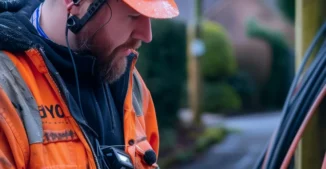Client Overview
Gigability Infra Limited specialise in rapid infrastructure deployments that bring high-speed internet and advanced technological solutions to communities that need it the most. As a growing company with a small, agile team, they sought to optimise their operational efficiency without inflating costs. The company faced several challenges around design planning, deployment management, and the effective use of resources, leading them to adopt MapAll to enhance their workflow and improve productivity.
The Challenge
For a startup company like Gigability, managing fibre deployment projects with a small core team means that being able to rely on an efficient, cost-effective tool that reduces the overhead of hiring external planners or third-party services is imperative.
Before using MapAll, Gigability’s workflow was fragmented, involving multiple platforms and manual processes for capturing survey data, designing network layouts, and managing deployment. Various tools were used in this process, such as Google Earth and QGIS to manage initial designs, Google Sheets for capturing data from the field, and various other systems for issuing work packages. This slowed down deployment and increased the risk of errors during data transfers between platforms.
It was clear that a unified solution was needed to streamline these operations, allowing the team to focus on accelerating their rural fibre deployments while minimising the administrative burden.
The Solution
Gigability implemented MapAll to centralise their design, planning, and deployment processes into a single, end-to-end platform. With MapAll, the team was able to plan, survey, and deploy fibre networks within one system, removing the need for manual data entry across multiple tools. The flexibility of MapAll enabled them to:
- Leverage Existing Infrastructure: Using MapAll, Gigability could easily integrate Openreach’s existing ducts and poles into their designs, creating work packages that clearly outlined the placement of cables, joints, and subducts.
- Create Work Packs in Real-Time: The platform allowed them to produce work packages quickly and intuitively, meaning that field teams knew exactly where to lay cables, install boxes, and troubleshoot deployment issues. This real-time reporting was critical for ensuring that the team could move swiftly without needing to engage third-party planners.
- Live Information and Reporting: MapAll’s real-time data capture helped the team monitor progress as it happened. They could access updates on where field teams were working, review designs, and manage tasks, all from one platform.
- Automate Documentation Processes: Another key benefit was the ability to quickly generate A55 documents (which are required by Openreach), removing the need for time-consuming manual preparation and submission.
By using MapAll, Gigability managed to streamline their workflow, reducing the time spent on planning and documentation and enabling the team to focus on actual deployment.
The Results
The impact of implementing MapAll was immediate and significant. Gigability reported a drastic improvement in both time efficiency and cost savings:
- Efficiency Gains: Gigability was able to condense what would typically take a month of design and deployment work into just three days. This rapid turnaround allowed the company to meet project deadlines faster, even for large-scale rural deployments involving up to 1,000 homes.
- Cost Savings: By using MapAll, Gigability estimated they saved approximately 75% on project costs. The reduction in the need for external planners and third-party services contributed directly to these savings, allowing them to allocate resources more effectively.
- Scalability and Flexibility: The off-the-shelf nature of MapAll made it easy for Gigability to implement the platform quickly with superb after care support that was always on hand.
Conclusion
For Gigability, the adoption of MapAll transformed their approach to rural FTTP deployment. The platform’s ability to consolidate planning, design, and deployment into a single tool allowed the company to work more efficiently, significantly cutting down on both time and costs. The support from MapAll’s development team, along with the system’s flexibility, ensured that Gigability could adapt the platform to their evolving needs, further enhancing operational efficiency.
The result was a highly optimised workflow that helped Gigability focus on scaling their operations and meeting the growing demand for rural fibre infrastructure.







